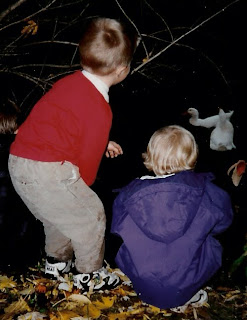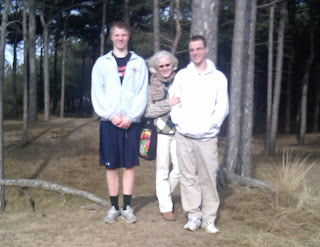 The Poise With Which We're Born
"To look up and not down,
The Poise With Which We're Born
"To look up and not down,
look forward and not back,
look out and not in . . ."
Edward Everett Hale (1822 - 1909)
American author and Unitarian clergyman
Hale's maxim for a healthy mental attitude uses the same words that Alexander applied to the ideal physical stance:
up, forward, out. In the photo above, you can see how four - year - old Sam executes this motion naturally, bending and balancing effortlessly.
I came to the Alexander Technique by way of tendonitis, whether from snow shoveling,
playing scales, swimming, or dragging my urban grocery cart around the streets of Philadelphia was never determined. A non-tennis player with tennis elbow, I began Alexander lessons as a way of learning how unconscious physical habits might be a contributing factor. The Alexander Technique focuses holistically on helping the student improve the "use" of the body; my "homework" involved lying flat on the floor and letting gravity pull the tension out of my joints. While the sessions do not work like magic, they do provide an instructive, calming method of learning to re-align your posture, always with the neck free, and the head forward and up. Additional Alexander imperatives are to take more time before moving any body part and to use no more energy than absolutely necessary, something I've been guilty of in piano, swimming, driving, and storming around in general. The goal is a new way of being in the world, not a way of escape.
A primary Alexander concept is to
pause, as does the 265 - year - old man in
The Tao of Pooh, who attributes his long life to "walking lightly" and "inner quiet" (see below, 110). The legendary F. M. Alexander, who founded the Technique, is supposed to have said on his death bed: "If I had it do over again, I think I would have been happier if I had paused more." Hmmmm. Something to think about.
Another principle is to
stop doing, i.e., we can't improve ourselves by changing or doing something different but only by
ceasing to do what is harming us in the first place. According to Alexander, our goal is to go forward, never back or sideways (even though going backward to a life before pain may seem preferable to our present situation). Musician and Alexander practitioner, Pedro De Alcantara invokes wise King Solomon on this topic: "Ask not thou, 'What is the cause the former days were better than these?' for thou dost not enquire wisely concerning this" (see below, 4). De Alcantara says that "Stress is a stimulus, strain a response. Clearly it is the response that causes a problem . . . The stress of life is permanent and inevitable," (2). Thus we study the Alexander Technique as a way of functioning that will reduce the strain to our selves.
I trust that the following titles, drawn from my amazon
LIST will aid in the endeavor.
Alexander Background
F.M.: The Life of Frederick Matthias Alexander: Founder of the Alexander Technique by Michael Bloch
F. Matthias Alexander: the Man and His Work by Lulie Westfeldt
Alexander Technique
Teach Yourself Alexander Technique by Richard Craze (New Edition):"The Alexander Technique is not a therapy, philosophy or creed . . . you won't be asked to change your diet, lifestyle or the way you dress. Nor will you be asked to "believe" anything. . . . And just to clear up a popular misconception, the Alexander Technique isn't a technique in the strict sense of the word. It is simply a way of learning to move our bodies in the way that they were designed to be moved"(2, 4).
Body Learning: An Introduction to the Alexander Technique by Michael Gelb: " . . . consider standing up...move into an upright posture. Congratulations! You have just re-enacted a process that took millions of years to develop. The upright posture...creates the possibility of effortless, easy movement but at the same time can cause tremendous insecurity if not functioning properly...most of us interfere with our balance by working too hard to hold ourselves up"(129).
The Alexander Technique: A Complete Course in How to Hold and Use Your Body for Maximum Energy by John Gray: "Modern living is so complex, hectic and... unnatural - we are wildly over-stimulated mentally and wrongly stimulated physically, sitting as we do for long periods at office desks or machines, cooped up in cars, rushing around leading over-busy lives or crushed together in trains and buses, frustrated and angry as we cope inadequately with what should be a full, rich life" (83 - 84).
Alexander Technique: For Health and Well-Being by Michèle Mac Donnell: "An understanding of the psycho-physical system as a whole is essentially focused on the co-ordination of the head, neck, back. If we interfere with the sophisticated and subtle relationship between these 3 regions, it can become distorted and strained. The Technique's preventive role is an efficient tool to maintain tone and general well - being, once integrated in our systems"(6).
Skill Related Studies
The Inner Game of Music by Barry Green
The Inner Game of Tennis: The Classic Guide to the Mental Side of Peak Performance by W. Timothy Gallwey: "Stress is a thief that, if we let it, can rob of of the enjoyment of our lives...The cause of most stress can be summed up by the word
attachment . . . Freedom from stress does not necessarily involve giving up anything, but rather being able to let go of anything, when necessary, and know that one will still be all right" (117).
Indirect Procedures: A Musician's Guide to the Alexander Technique by Pedro de Alcantara: "Practising localized finger exercises designed to solve a perceived problem easily becomes part of the problem. The great historical example of this folly is the permanent injury that the young Robert Schumann did to his hands while trying to improve the working of his ring fingers" (143). Of all the Alexander "how-to" writers, Alcantara is the best at showing the scientific basis for Alexander's concepts as well as capturing the philosophical side (just in case you're wondering whether it's science or religion). Written by authors who are better thinkers than writers,
Inner Music and
Inner Tennis are full of great ideas but not necessarily great prose. Alcantara, on the other hand, writes beautifully: " . . . the continuity of the musical line . . . is more important than getting all the notes right" (57).
Just Play Naturally: An account of her study with Pablo Casals in the 1950's and her discovery of the resonance between his teaching and the principles of the Alexander Technique by Vivien Mackie: "It was that I must be, in my entire being, right here, with what I'm doing
now . . . there is no attention to spare for what has gone before, and there is no attention to spare for what is coming next . . . I really did manage to keep at bay all the ghosts and gremlins . . . And treat the occasion as pure adventure . . . accepting what happens with open arms and meeting it as it comes" (73, 103). As part of her Prologue (xix), Mackie quotes the following from "Song of Myself":
"I have heard what the talkers were talking,
the talk of the beginning and the end,
But I do not talk of the beginning or the end.
There was never any more inception than there is now.
Nor any more youth or age than there is now,
And will never be any more perfection than there is now.
Nor any more heaven or hell than there is now."
by Walt Whitman, 1819 - 1892
American poet, essayist, journalist, and humanist
Personal Favorites
Jonathan Livingston Seagull by Richard Bach: "Overcome space, and all we have left is Here. Overcome time, and all we have left is Now" (87).
The Tao of Pooh by Benjamin Hoff: "The Pooh Way" is consistent with "The Alexander Way," both mentally and physically. The concept of "wu wei" means without doing, making, or causing, "no going against the nature of things; no clever tampering...I go down with the water and come up with the water. I follow it and forget myself. I survive because I don't struggle against the water's superior power. That's all" (68-69, see 67 - 90). Nothing to live against!
Desiderata by Max Ehrmann: A poem for all times, perfect for the Alexander student: "Go placidly amid the noise and the haste, and remember what peace there may be in silence. . . . Avoid [vexations] to the spirit. . . .Nurture strength of spirit . . . do not distress yourself with dark imaginings. . . . be gentle with yourself. You are a child of the universe." [See my earlier (October 2, 2009)
Desiderata blog post:
"Be Careful!"]
Trust Your Heart by Judy Collins: This CD is a soothing Alexander companion, especially the title song:
"Trust Your Heart"*
In the sky the phantom moon appears at midday
To join the sun in some forgotten dance
In their light our voices tremble with reflections
Of what we know and what we leave to chance
The heart can see beyond the sun
Beyond the turning moon
And as we look
The heart will teach us
All we need to learn
We have dreams, we hold them to the light like diamonds
Stones of the moon and splinters of the sun
Some we keep to light the dark nights on our journey
And shine beyond the days that we have won
The heart can see beyond our prayers
Beyond our fondest schemes
And tell us which are made for fools
And which are wise men's dreams
Trust your heart
Trust your heart
**********************
and
"The Life You Dream"*
There's a time that comes once every morning
When you choose the kind of day you will have
It comes in with the sun and you know you've begun
To live the life you dream
You can light all your candles to the dawn
And surrender yourself to the sunrise
You can make it wrong you can make it right
You can live the life you dream
Pray to Buddha pray to Krishna pray to Jesus
Or the shadow of the devil on your wall
Anyone you call
will come
The night comes to you dressed in darkness
Descends on your body like a blessing
You can lie in its arms it will heal your heart
You can life the life you dream
You can wake in this vale of tears
You can laugh like a child again
You can make it right you can make it wrong
You can live the life you dream
What you see and you believe is not the answer
To anything that matters very much
Anything you touch
is gone
In the valleys you look for the mountains
In the mountains you search the rivers
You have no where to go you are where you belong
You can live the life you dream
If you call him your master will find you
Seven bars on the gate will not hold him
Seven fires burning bright only give him delight
You can live the life you dream
All your treasure buys you nothing but the moment
All your poverty has lost you everything
Love will teach your dream
to sing
* Words and Music by Judy Collins
Universal Music Corp; The Wildflowers Company
WWW.JUDYCOLLINS.COM
P.S. also on The Quotidian Kit:
"Dream for Your Life"
"Alexander Technique"
OT: Elbow Gazing
and my LIST on amazon


 . . . also loved staying up late
. . . also loved staying up late 

























